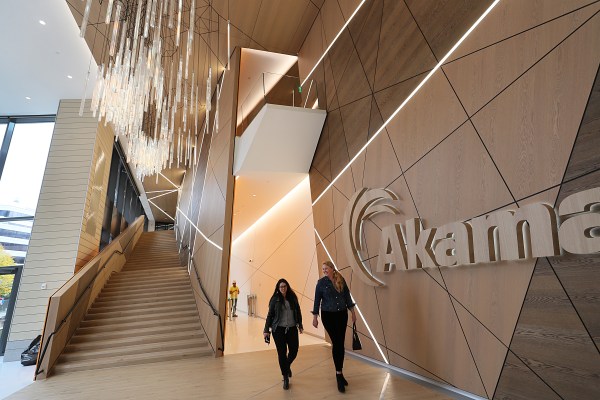Why Akamai bought Linode – TechCrunch
Earlier this year, Akamai announced its plans to acquire Linode, the well-loved cloud hosting service, to build out its own cloud and edge computing portfolio. The $900 million acquisition closed last month. While Akamai is still mostly known for its content delivery services, the company started building out more compute-centric services over the course of the last few years, in part because of requests from existing customers. Apple, for example, is using Akamai for its Private Relay service. Now, with Linode, the company plans to quickly build out this portfolio — and in the course of this, transform Akamai into a bit of a different company, too.
To talk about what the acquisition means for the future of Akamai, I sat down with Adam Karon, the company’s COO and GM of its Edge Technology Group.
Karon said he basically spent his entire career at Akamai, which he joined back in 2005, to get this done. Back then, Akamai offered a service called Edge Java that allowed developers to deploy application servers at the edge of the company’s network. In many ways, though, the market wasn’t ready for this service yet.
“This is before AWS,” Karon explained. “Akamai was too early to market back then and we didn’t continue the product. But it was very depressing for me as a developer to not continue that. So then finally, to be able to lead this acquisition through the end of last year into this year, it was really exciting to see it come to fruition — to really have a full-fledged computing platform we can build on now.”
He also noted that Akamai had been getting more and more requests from its existing customers to offer more edge computing services, with Apple leading the charge here for its Private Relay. “A year and a half ago, Apple[…] came and they said: ‘you know, we’re going to need to do delivery as part of this proxy service, but we do need a compute component for this as well. And, you know, what about us using your edge for running our VMs or containers,’” Karon said. Akamai already had an internal platform that would allow it to do this and so the team decided to offer that to Apple as well. Unsurprisingly, that led to other customers also wanting similar capabilities.
“It was really our customers, starting with Apple, pushing us in this direction. We wanted to play in this space but we just weren’t sure whether or not our customers would think of us here,” Karon explained. “But we always felt like we had a right to be in this space. We always sat between compute and the end user and we did do some compute on our edge. We had our application serverless [platform], whether it was with JavaScript or our own metadata language — we were doing business logic but we couldn’t really do like full-fledged compute.”
To build out those capabilities, Akamai could have built out its own compute service, but the team decided that it wanted to move quickly to capitalize on this opportunity. Akamai’s existing service currently runs in 100 locations, but the idea is to collapose both platforms into one so that at the end, it’s just Linode.
But beyond that, Karon noted that it’s not just about moving fast but also transforming Akamai’s focus on enterprise customers to become more developer centric. I barely have a conversation with an enterprise company today where somebody doesn’t talk about how developers are increasingly the decision makers, so it makes sense for Akamai to also delve deeper into this space. Today, developers set up a server on Linode with their credit card, but that’s obviously not the way Akamai has sold its business over the years.
“We want to give that experience for not just our new compute — we want that experience for all of our products. And we’ve been moving in that direction, but we’re not where Linode is today for our enterprise product,” Karon explained.
For Linode itself, nothing is changing right now. The name stays, Karon said, and the prices remain the same. But Akamai is also investing heavily in helping the Linode team build out its service, expand into new data centers and build out its feature set, with a new database-as-a-service offering launching soon, for example, likely followed by an expansion of its managed container service with more enterprise features. Karon also mentioned additional virtual private cloud features for Linode that are in the pipeline.
Karon also noted that on the other side, Akamai will likely want to be able to offer non-enterprise customers on Linode the ability to buy CDN capabilities. It already built some of these capabilities when it launched its click-to-buy CDN solution for Azure a few years ago. The plan here is to launch that by the end of this year. Akamai also plans to bring its security expertise to Linode by adding a basic web application protector (WAP) to the service.
With 250 employees, Linode is obviously the smaller company here. Akamai has 10,000 employees. The overall idea here, though, is to keep Linode’s culture intact in the process of merging the two businesses. “In many other acquisitions, the way we do integration is you take existing teams, you move them to their peer team, and you break apart the old company and you move it into the right locations. And that creates a cultural disaster in many cases, right? It really says, ‘I don’t care about the culture I just bought.’ In this case, we did it reverse,” he explained. “We’re going to inject Akamai into Linode, as opposed to putting Linode inside Akamai.” He also noted that at the engineering level, the two companies’ cultures are already very much the same anyway. Karon described walking into Linode like walking into Akamai a decade ago.
“The cultures are really good matches,” Karon added. “They’re not as different as you would think but the priorities that they choose are different. They’re choosing the developer over the enterprise and the world is shifting to where the enterprise is becoming the developer. And we see that so we want to shift to the developer as our primary customer without losing our enterprise focus.”
The one thing Akamai doesn’t want to build, though, is another AWS. That’s something Karon was quite adamant about. “You should hang up on me right now if I said that,” he told me. The big clouds are partners for Akamai and just like they offer their own CDN services at times, Akamai thinks it can also build a compute service and still be a good partner to them as well. “We want to build out a core set of features to offer our customers diversity when they need it, edge capability when they need it and work in synergy. So we’re not going out there attempting to build another AWS,” he said.





Pingback: my website
Pingback: stapelstein